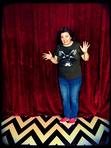On My Shelf: Willy Wonka and the Chocolate Factory (1971)
I didn't grow up watching this movie... which probably informs a lot of the way I feel about it. Which is both a good and bad thing.
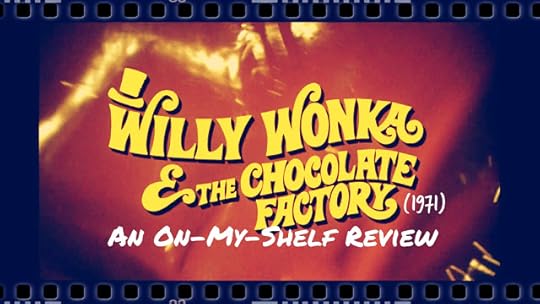
Plot: Charlie, a poor and honest boy, desperately loves chocolate -- but he doesn't get to eat it very much, on account of being extremely poor. Luckily, Willy Wonka (owner of the greatest chocolate factory ever) decides to launch a contest: five golden tickets (guaranteeing a lifetime supply of chocolate and a tour of his fabulous factory) are going to be randomly distributed in five chocolate bars. Slowly, the tickets are discovered (by horrible, horrible children); can Charlie beat the odds to find one of the tickets and win the prize? (And if he does -- will he survive the nightmarish factory tour that follows?)
Performances, Design, Music
The performances, design, and music in this movie are all pretty solid. The songs are nice and memorable, the performances are good (more on that below) and the design is appropriately inventive for a "wacky, creative inventor" type situation. That said...
Book vs. Movie
I just (this past weekend) read the book that this film is based upon. Supposedly, author Road Dahl hated this film, and I was curious to see how and why that might have been.
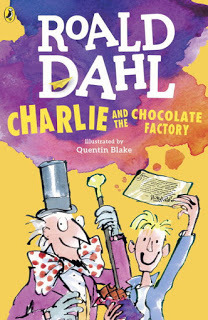
Well, to my mind the film was actually pretty faithful to the basic structure and premise of the book -- right down to using the dialogue straight-up, as-written. It followed the same basic path of setting up what a good kid Charlie is, and what bad kids the other four kids are... I mean, ultimately the book is a big morality tale about why you shouldn't be a terribly behaved child -- and that is wholly intact in the film.
But there were a few differences between the movie and the book.
Most of the differences are niggly little things... In the book, Charlie has two parents (a Mom and a Dad) ...not just a Mom. (Granted, Dad doesn't do much in the book, so cutting him was probably just a film cost-saving measure). In the book, Grandpa Joe was 90-something years old -- and, clearly, the Grandpa Joe in this movie is more like 55. In the book, there are a few parts of the factory that they stop at which they don't stop at in the movie (and vice versa). In the book, the only songs are sung in the factory -- not the pre-factory songs from the movie, where Mom sings to "Cheer up, Charlie", Grandpa Joe sings about "his" golden ticket -- or the Candy Man with his self-congratulatory song. And Charlie's one act of civil disobedience -- drinking the "Fizzy Lifting Drink" -- isn't in the book.
The main, big difference would be Willy Wonka himself: Gene Wilder.
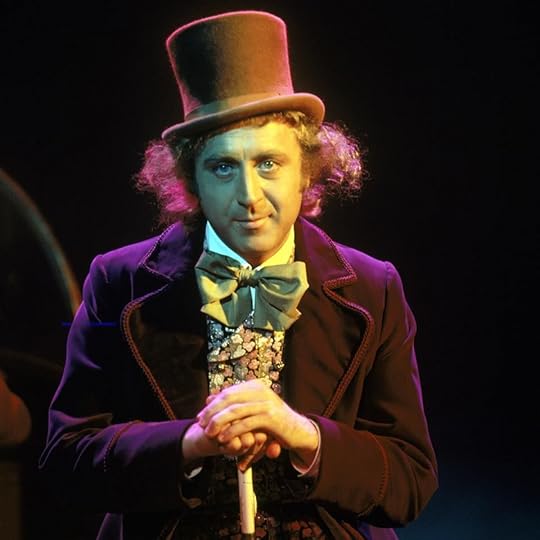
In the book, Willy Wonka is described as being a jolly jokester -- a happy, enthusiastic man with a short-attention span, constantly darting around "like a squirrel". He's basically an ADHD kid at heart and frequently doesn't follow the rules of reality -- because he isn't quite bound reality, just by his imagination. He lives in an Alice-in-Wonderland factory of his own design... and he loves it!
Gene Wilder, on the other hand, plays Willy Wonka like a frightening serial killer -- and/or a man about one frazzled hair away from a serious mental and emotional breakdown.
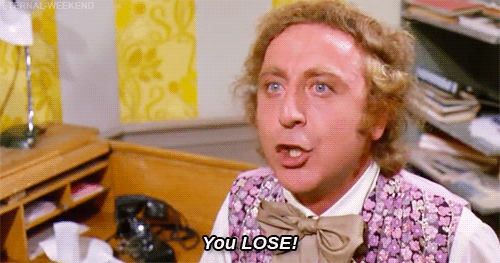
PLEASE NOTE: I'm not saying this is a bad thing! As a matter of fact, I get a huge kick out of Gene Wilder's performance. It's like watching a Christopher Walken performance -- so inappropriate to any given situation, and therefore extremely fun an dattention-grabbing. You're constantly like, "What will he do next? Are we friends, or is he going to murder my family? Are we friends AND he's going to murder my family?"
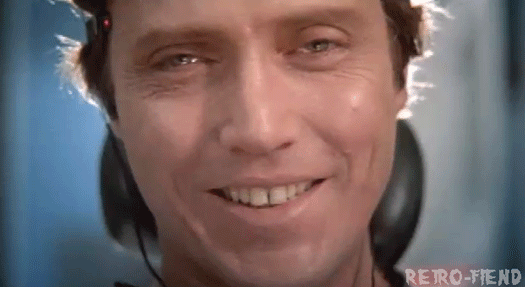 Happy? Sad? Mentally peeling off your skin?Gene Wilder (apparently) decided that the reason Willy Wonka isn't bound by the rules of reality is that he's profoundly damaged. That's fine! If there's one thing you can't accuse Gene Wilder of in this film, it's "not being committed to the performance". He owns this performance of an internally broken, insane Willy Wonka, and we all love him for it.
Happy? Sad? Mentally peeling off your skin?Gene Wilder (apparently) decided that the reason Willy Wonka isn't bound by the rules of reality is that he's profoundly damaged. That's fine! If there's one thing you can't accuse Gene Wilder of in this film, it's "not being committed to the performance". He owns this performance of an internally broken, insane Willy Wonka, and we all love him for it.
That said, was it faithful to the book?
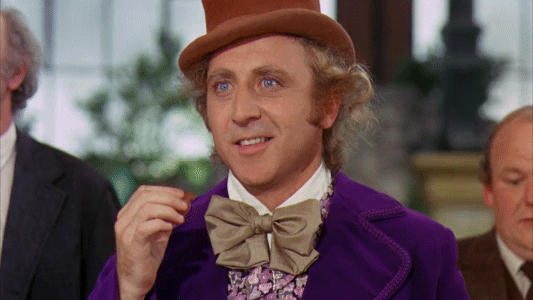
Well, that's a complicated answer. Having read Gene Wilder's autobiography (which I don't recommend, by the way, but that's a whole other review...) I feel that he strove to get a handle on the character and was faithful to that interpretation. Which doesn't necessarily mean it was faithful to the author's intention. Having read the Roald Dah's book now, I would actually not say that Gene Wilder's Willy Wonka was much like the Willy Wonka in the book, with the exception of saying a lot of the same things. On top of being insane, Gene Wilder's Willy Wonka seems somewhat melancholic, which simply didn't seem to be part of the equation where the book was concerned. In the end, then -- no, Gene Wilder's Willy Wonka is not a particularly faithful interpretation of the character. It might be faithful to what Gene Wilder extrapolated as an actor (and as a 1970's person, well versed with the psychoanalyst's couch and loopy 1960's emotion-based acting methods), but on a strict reading of the book, I really don't think that extrapolation was wholly accurate.
Other Notes...
I'm a little lukewarm on the character of Charlie in this film.
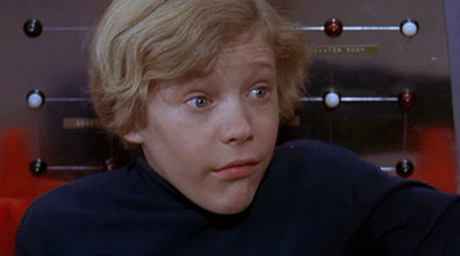 He always seems to have this expression on his face.Granted, he's the book's eponymous main character -- but, like in the book, once he gets to the factory he simply doesn't have much to do, other than "not behave badly". After finding the golden ticket, he's just an observer. The film (perhaps to combat this issue with the book) added a scene where Charlie breaks Mr. Wonka's rules and drinks "Fizzy Lifting Drink" (and almost gets ground up in a giant fan as a consequence). I can see why they did this -- it was to give Charlie SOMETHING TO DO, so that you don't forget that Charlie exists. That said, why was their solution to "Charlie needs something to do" to give him inexplicable disobedient behavior? (Especially when the whole story is about punishing children who act in a disobedient fashion?) Was it because all the other kids had a weakness of some kind, and it simply seemed balanced for Charlie to have a weakness, too? Or was it just lazy, sloppy writing that wasn't concerned about what was truthful for the characters or the author's intention?
He always seems to have this expression on his face.Granted, he's the book's eponymous main character -- but, like in the book, once he gets to the factory he simply doesn't have much to do, other than "not behave badly". After finding the golden ticket, he's just an observer. The film (perhaps to combat this issue with the book) added a scene where Charlie breaks Mr. Wonka's rules and drinks "Fizzy Lifting Drink" (and almost gets ground up in a giant fan as a consequence). I can see why they did this -- it was to give Charlie SOMETHING TO DO, so that you don't forget that Charlie exists. That said, why was their solution to "Charlie needs something to do" to give him inexplicable disobedient behavior? (Especially when the whole story is about punishing children who act in a disobedient fashion?) Was it because all the other kids had a weakness of some kind, and it simply seemed balanced for Charlie to have a weakness, too? Or was it just lazy, sloppy writing that wasn't concerned about what was truthful for the characters or the author's intention?
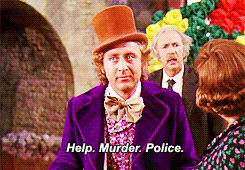
WELL, the problem with going that route, of course, is that the screenplay was by ROALD DAHL, the author of the book. So I can't exactly say this scene wasn't the author's intention... but I also can't say that just because he wrote the screenplay that he had final say on what wound up in the film, so maybe he didn't even write this segment. So who knows? All I can say is that it didn't really work, but it happened, so... just try to ignore it, or something.
A Special Note on Grandpa Joe...
A lot of people don't like Charlie's Grandpa Joe in this movie (and when I say "a lot", type in "I hate Grandpa Joe" on Google sometime).
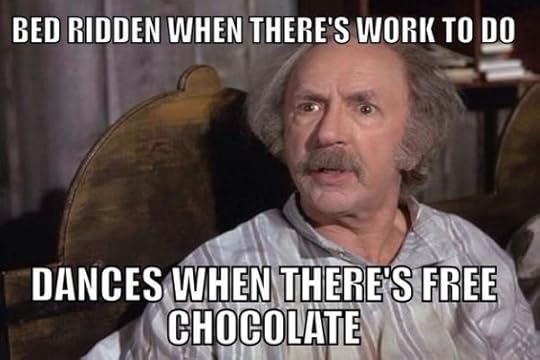
Makes sense. The way he's portrayed, he's a wholly healthy and able man who has lain in bed for twenty years, allowing Charlie's mother to work and slave for him, evidently out of sheer laziness. He finally hops out of bed because he claims Charlie's success with the golden ticket for himself -- and is personally responsible for the one bad thing in the film that Charlie does. I don't know if he came across as a jerk accidentally or on purpose -- but it happened, and people HATE GRANDPA JOE.
Does this hurt the movie? Well... yes and no. Yes, if the intention really was for us to like Grandpa Joe (and it does seem to be the intention). No, because it just kind of adds to the weird, unexpected, fractured quality of the film that makes it entertaining. So... let's all hate Grandpa Joe!
The Ending (SPOILERS)
***.... So, in the end, Charlie wins! After a somewhat inexplicable test of his character, Charlie is told that he wins the factory (which makes more sense in the book, because Willy Wonka admits in the book that he's actually quite old and needs someone to take over when he goes -- as opposed to Gene Wilder, who looks to be in his early thirties in this film, and his claim that he "can't go on forever" seems unecessarily dire and frightening) ...And then the movie ABRUPTLY ENDS. I was hoping, after reading the book, to drag this movie over the coals for just shutting down the story (probably for cost reasons)... only to discover that's basically what happens in the book, as well. So, I guess it's just kind of an unsatisfactory ending in general, because the author was intending to pick up immediately with a sequel (which he did, in book form - Charlie and the Great Glass Elevator, which picks up exactly where the book left off - but this has, thusfar, not made it to film form.)***
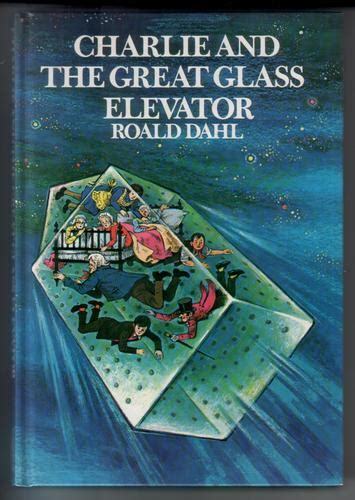 Looks exciting... guess I have to read more BOOKS to find out what happens in it...Ultimately...
Looks exciting... guess I have to read more BOOKS to find out what happens in it...Ultimately...
I like this movie. In intention it seems relatively faithful to the book, which is good. I like Gene Wilder's performance, even though it's as weird as all-get-out. I like the music and the set design (even though the chocolate river doesn't really And if you haven't seen it, I'd recommend watching it, as there's a ton of pop-culture references to it. But is it weird? Yes. Does it straight-up work as a movie? Hmm. If you're an adult, I would say this movie is an acquired taste. But it may be worth acquiring.
MOSTLY RECOMMENDED(Acquired Taste)

Plot: Charlie, a poor and honest boy, desperately loves chocolate -- but he doesn't get to eat it very much, on account of being extremely poor. Luckily, Willy Wonka (owner of the greatest chocolate factory ever) decides to launch a contest: five golden tickets (guaranteeing a lifetime supply of chocolate and a tour of his fabulous factory) are going to be randomly distributed in five chocolate bars. Slowly, the tickets are discovered (by horrible, horrible children); can Charlie beat the odds to find one of the tickets and win the prize? (And if he does -- will he survive the nightmarish factory tour that follows?)
Performances, Design, Music
The performances, design, and music in this movie are all pretty solid. The songs are nice and memorable, the performances are good (more on that below) and the design is appropriately inventive for a "wacky, creative inventor" type situation. That said...
Book vs. Movie
I just (this past weekend) read the book that this film is based upon. Supposedly, author Road Dahl hated this film, and I was curious to see how and why that might have been.

Well, to my mind the film was actually pretty faithful to the basic structure and premise of the book -- right down to using the dialogue straight-up, as-written. It followed the same basic path of setting up what a good kid Charlie is, and what bad kids the other four kids are... I mean, ultimately the book is a big morality tale about why you shouldn't be a terribly behaved child -- and that is wholly intact in the film.
But there were a few differences between the movie and the book.
Most of the differences are niggly little things... In the book, Charlie has two parents (a Mom and a Dad) ...not just a Mom. (Granted, Dad doesn't do much in the book, so cutting him was probably just a film cost-saving measure). In the book, Grandpa Joe was 90-something years old -- and, clearly, the Grandpa Joe in this movie is more like 55. In the book, there are a few parts of the factory that they stop at which they don't stop at in the movie (and vice versa). In the book, the only songs are sung in the factory -- not the pre-factory songs from the movie, where Mom sings to "Cheer up, Charlie", Grandpa Joe sings about "his" golden ticket -- or the Candy Man with his self-congratulatory song. And Charlie's one act of civil disobedience -- drinking the "Fizzy Lifting Drink" -- isn't in the book.
The main, big difference would be Willy Wonka himself: Gene Wilder.

In the book, Willy Wonka is described as being a jolly jokester -- a happy, enthusiastic man with a short-attention span, constantly darting around "like a squirrel". He's basically an ADHD kid at heart and frequently doesn't follow the rules of reality -- because he isn't quite bound reality, just by his imagination. He lives in an Alice-in-Wonderland factory of his own design... and he loves it!
Gene Wilder, on the other hand, plays Willy Wonka like a frightening serial killer -- and/or a man about one frazzled hair away from a serious mental and emotional breakdown.

PLEASE NOTE: I'm not saying this is a bad thing! As a matter of fact, I get a huge kick out of Gene Wilder's performance. It's like watching a Christopher Walken performance -- so inappropriate to any given situation, and therefore extremely fun an dattention-grabbing. You're constantly like, "What will he do next? Are we friends, or is he going to murder my family? Are we friends AND he's going to murder my family?"
 Happy? Sad? Mentally peeling off your skin?Gene Wilder (apparently) decided that the reason Willy Wonka isn't bound by the rules of reality is that he's profoundly damaged. That's fine! If there's one thing you can't accuse Gene Wilder of in this film, it's "not being committed to the performance". He owns this performance of an internally broken, insane Willy Wonka, and we all love him for it.
Happy? Sad? Mentally peeling off your skin?Gene Wilder (apparently) decided that the reason Willy Wonka isn't bound by the rules of reality is that he's profoundly damaged. That's fine! If there's one thing you can't accuse Gene Wilder of in this film, it's "not being committed to the performance". He owns this performance of an internally broken, insane Willy Wonka, and we all love him for it.That said, was it faithful to the book?

Well, that's a complicated answer. Having read Gene Wilder's autobiography (which I don't recommend, by the way, but that's a whole other review...) I feel that he strove to get a handle on the character and was faithful to that interpretation. Which doesn't necessarily mean it was faithful to the author's intention. Having read the Roald Dah's book now, I would actually not say that Gene Wilder's Willy Wonka was much like the Willy Wonka in the book, with the exception of saying a lot of the same things. On top of being insane, Gene Wilder's Willy Wonka seems somewhat melancholic, which simply didn't seem to be part of the equation where the book was concerned. In the end, then -- no, Gene Wilder's Willy Wonka is not a particularly faithful interpretation of the character. It might be faithful to what Gene Wilder extrapolated as an actor (and as a 1970's person, well versed with the psychoanalyst's couch and loopy 1960's emotion-based acting methods), but on a strict reading of the book, I really don't think that extrapolation was wholly accurate.
Other Notes...
I'm a little lukewarm on the character of Charlie in this film.
 He always seems to have this expression on his face.Granted, he's the book's eponymous main character -- but, like in the book, once he gets to the factory he simply doesn't have much to do, other than "not behave badly". After finding the golden ticket, he's just an observer. The film (perhaps to combat this issue with the book) added a scene where Charlie breaks Mr. Wonka's rules and drinks "Fizzy Lifting Drink" (and almost gets ground up in a giant fan as a consequence). I can see why they did this -- it was to give Charlie SOMETHING TO DO, so that you don't forget that Charlie exists. That said, why was their solution to "Charlie needs something to do" to give him inexplicable disobedient behavior? (Especially when the whole story is about punishing children who act in a disobedient fashion?) Was it because all the other kids had a weakness of some kind, and it simply seemed balanced for Charlie to have a weakness, too? Or was it just lazy, sloppy writing that wasn't concerned about what was truthful for the characters or the author's intention?
He always seems to have this expression on his face.Granted, he's the book's eponymous main character -- but, like in the book, once he gets to the factory he simply doesn't have much to do, other than "not behave badly". After finding the golden ticket, he's just an observer. The film (perhaps to combat this issue with the book) added a scene where Charlie breaks Mr. Wonka's rules and drinks "Fizzy Lifting Drink" (and almost gets ground up in a giant fan as a consequence). I can see why they did this -- it was to give Charlie SOMETHING TO DO, so that you don't forget that Charlie exists. That said, why was their solution to "Charlie needs something to do" to give him inexplicable disobedient behavior? (Especially when the whole story is about punishing children who act in a disobedient fashion?) Was it because all the other kids had a weakness of some kind, and it simply seemed balanced for Charlie to have a weakness, too? Or was it just lazy, sloppy writing that wasn't concerned about what was truthful for the characters or the author's intention?
WELL, the problem with going that route, of course, is that the screenplay was by ROALD DAHL, the author of the book. So I can't exactly say this scene wasn't the author's intention... but I also can't say that just because he wrote the screenplay that he had final say on what wound up in the film, so maybe he didn't even write this segment. So who knows? All I can say is that it didn't really work, but it happened, so... just try to ignore it, or something.
A Special Note on Grandpa Joe...
A lot of people don't like Charlie's Grandpa Joe in this movie (and when I say "a lot", type in "I hate Grandpa Joe" on Google sometime).

Makes sense. The way he's portrayed, he's a wholly healthy and able man who has lain in bed for twenty years, allowing Charlie's mother to work and slave for him, evidently out of sheer laziness. He finally hops out of bed because he claims Charlie's success with the golden ticket for himself -- and is personally responsible for the one bad thing in the film that Charlie does. I don't know if he came across as a jerk accidentally or on purpose -- but it happened, and people HATE GRANDPA JOE.
Does this hurt the movie? Well... yes and no. Yes, if the intention really was for us to like Grandpa Joe (and it does seem to be the intention). No, because it just kind of adds to the weird, unexpected, fractured quality of the film that makes it entertaining. So... let's all hate Grandpa Joe!
The Ending (SPOILERS)
***.... So, in the end, Charlie wins! After a somewhat inexplicable test of his character, Charlie is told that he wins the factory (which makes more sense in the book, because Willy Wonka admits in the book that he's actually quite old and needs someone to take over when he goes -- as opposed to Gene Wilder, who looks to be in his early thirties in this film, and his claim that he "can't go on forever" seems unecessarily dire and frightening) ...And then the movie ABRUPTLY ENDS. I was hoping, after reading the book, to drag this movie over the coals for just shutting down the story (probably for cost reasons)... only to discover that's basically what happens in the book, as well. So, I guess it's just kind of an unsatisfactory ending in general, because the author was intending to pick up immediately with a sequel (which he did, in book form - Charlie and the Great Glass Elevator, which picks up exactly where the book left off - but this has, thusfar, not made it to film form.)***
 Looks exciting... guess I have to read more BOOKS to find out what happens in it...Ultimately...
Looks exciting... guess I have to read more BOOKS to find out what happens in it...Ultimately...I like this movie. In intention it seems relatively faithful to the book, which is good. I like Gene Wilder's performance, even though it's as weird as all-get-out. I like the music and the set design (even though the chocolate river doesn't really And if you haven't seen it, I'd recommend watching it, as there's a ton of pop-culture references to it. But is it weird? Yes. Does it straight-up work as a movie? Hmm. If you're an adult, I would say this movie is an acquired taste. But it may be worth acquiring.
MOSTLY RECOMMENDED(Acquired Taste)
Published on April 20, 2018 11:36
No comments have been added yet.

